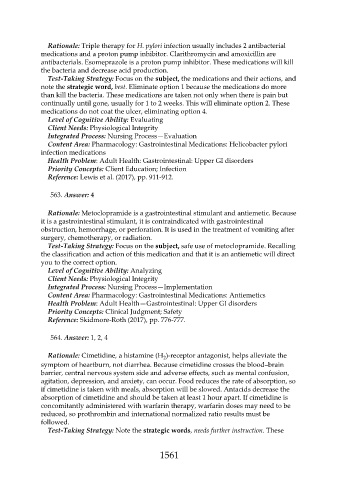Page 1561 - Saunders Comprehensive Review For NCLEX-RN
P. 1561
Rationale: Triple therapy for H. pylori infection usually includes 2 antibacterial
medications and a proton pump inhibitor. Clarithromycin and amoxicillin are
antibacterials. Esomeprazole is a proton pump inhibitor. These medications will kill
the bacteria and decrease acid production.
Test-Taking Strategy: Focus on the subject, the medications and their actions, and
note the strategic word, best. Eliminate option 1 because the medications do more
than kill the bacteria. These medications are taken not only when there is pain but
continually until gone, usually for 1 to 2 weeks. This will eliminate option 2. These
medications do not coat the ulcer, eliminating option 4.
Level of Cognitive Ability: Evaluating
Client Needs: Physiological Integrity
Integrated Process: Nursing Process—Evaluation
Content Area: Pharmacology: Gastrointestinal Medications: Helicobacter pylori
infection medications
Health Problem: Adult Health: Gastrointestinal: Upper GI disorders
Priority Concepts: Client Education; Infection
Reference: Lewis et al. (2017), pp. 911-912.
563. Answer: 4
Rationale: Metoclopramide is a gastrointestinal stimulant and antiemetic. Because
it is a gastrointestinal stimulant, it is contraindicated with gastrointestinal
obstruction, hemorrhage, or perforation. It is used in the treatment of vomiting after
surgery, chemotherapy, or radiation.
Test-Taking Strategy: Focus on the subject, safe use of metoclopramide. Recalling
the classification and action of this medication and that it is an antiemetic will direct
you to the correct option.
Level of Cognitive Ability: Analyzing
Client Needs: Physiological Integrity
Integrated Process: Nursing Process—Implementation
Content Area: Pharmacology: Gastrointestinal Medications: Antiemetics
Health Problem: Adult Health—Gastrointestinal: Upper GI disorders
Priority Concepts: Clinical Judgment; Safety
Reference: Skidmore-Roth (2017), pp. 776-777.
564. Answer: 1, 2, 4
Rationale: Cimetidine, a histamine (H )-receptor antagonist, helps alleviate the
2
symptom of heartburn, not diarrhea. Because cimetidine crosses the blood–brain
barrier, central nervous system side and adverse effects, such as mental confusion,
agitation, depression, and anxiety, can occur. Food reduces the rate of absorption, so
if cimetidine is taken with meals, absorption will be slowed. Antacids decrease the
absorption of cimetidine and should be taken at least 1 hour apart. If cimetidine is
concomitantly administered with warfarin therapy, warfarin doses may need to be
reduced, so prothrombin and international normalized ratio results must be
followed.
Test-Taking Strategy: Note the strategic words, needs further instruction. These
1561

